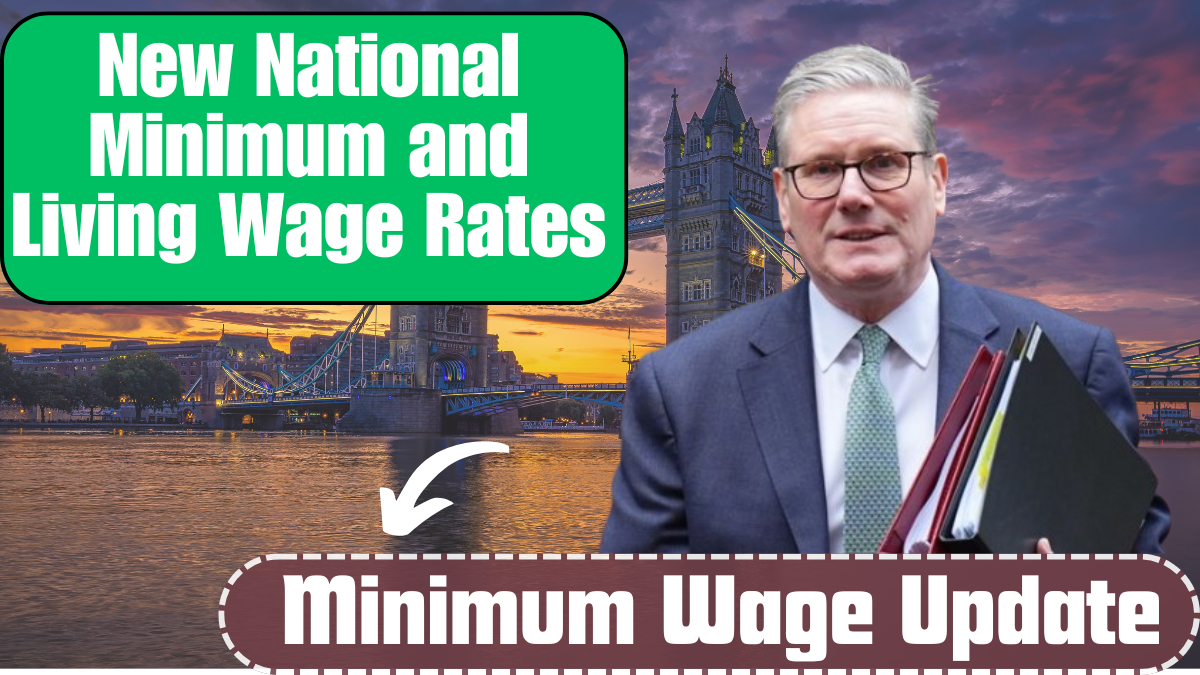Starting April 1, 2025, the UK will implement its latest round of minimum wage adjustments, offering a pay rise to millions across the country. These changes come in response to the rising cost of living and are aimed at supporting lower-income workers while ensuring wage fairness across all age brackets.
Whether you’re an employee wondering how much more you’ll earn—or an employer preparing for payroll adjustments—this breakdown will help you stay ahead of the curve.

Understanding the National Minimum Wage vs National Living Wage
The National Minimum Wage (NMW) and National Living Wage (NLW) are the legally mandated hourly pay rates set by the UK Government. These rates are reviewed each year based on recommendations from the Low Pay Commission and reflect shifts in inflation, cost of living, and labour market conditions.
The NMW applies to workers under the age of 21 or those in apprenticeships, while the NLW now includes anyone aged 21 and over—a shift from the previous 23+ threshold.
These updates reflect a broader effort to raise income levels for younger and lower-paid workers across various industries, from retail to hospitality.
UK Minimum Wage Rates Effective April 2025
Here’s how the new rates compare with the previous year:
| Category | 2024 Rate (£) | 2025 Rate (£) | Increase (£) | Increase (%) |
|---|---|---|---|---|
| National Living Wage (21+) | £11.44 | £12.21 | £0.77 | 6.7% |
| 18–20 Year Old Rate | £8.60 | £10.00 | £1.40 | 16.3% |
| 16–17 Year Old Rate | £6.40 | £7.55 | £1.15 | 18.0% |
| Apprentice Rate | £6.40 | £7.55 | £1.15 | 18.0% |
| Accommodation Offset (Daily) | £10.66 | £11.33 | £0.67 | 6.3% |
These new figures mark one of the largest percentage increases in recent years, particularly for younger workers and apprentices.
How These Increases Affect Workers
For workers aged 21 and over, the boost to £12.21 per hour means more money in your pocket—especially for those working full-time. A 37.5-hour work week at this rate brings annual earnings up to £24,441, compared to £22,918 the previous year.
Younger workers will also feel the benefit. For example, an 18-year-old earning £10.00 per hour will now earn over £1,000 more annually than before helping to bridge the wage gap between age groups.
Apprenticeship roles, often seen as low-paid entry points, are now more attractive with the hourly rate raised to £7.55.
Impact on Employers and Businesses
While this wage update supports fairer pay, it also creates pressure for employers, especially in sectors where a high number of employees are paid at or near the minimum wage.
Small businesses, hospitality venues, and retailers will need to prepare for:
- Higher wage bills and operating costs
- Adjustments to payroll systems before April
- Potential restructuring of staff hours or contracts to maintain budget balance
Employers must also ensure compliance to avoid financial penalties—failing to pay minimum wage can result in fines of up to £20,000 per underpaid worker.
How Employers Can Prepare
To ensure a smooth transition, employers are advised to:
- Update payroll systems with the new hourly rates
- Communicate clearly with employees about upcoming changes
- Provide training to HR and payroll teams to avoid errors
- Review employment contracts, especially for apprentices or under-21 staff
It’s also smart to re-examine your overall staffing structure and scheduling, particularly if your business relies on part-time or seasonal labour.
Tax and Benefits Considerations for Workers
As your wages increase, you might move into a higher tax bracket or see adjustments to benefit eligibility. If you’re receiving Universal Credit, Housing Benefit, or Council Tax support, it’s worth reviewing your status through your local authority or GOV.UK tools.
Make sure your employer is applying the correct tax code, especially if you’ve recently changed jobs or started working multiple roles.
FAQs
What is the National Living Wage for 2025?
The NLW is set at £12.21 per hour from April 1, 2025, for workers aged 21 and over.
Who qualifies for the new minimum wage?
Anyone legally employed in the UK, including part-time workers, temporary staff, and apprentices, is entitled to the new rates based on their age and job status.
Does the increase apply to apprentices?
Yes. The apprentice rate has increased from £6.40 to £7.55 per hour, starting April 2025.
How often do these rates change?
The government updates minimum wage rates annually, typically in April.
What if I’m not being paid the correct rate?
Contact your employer immediately. If unresolved, you can report it to Acas at 0300 123 1100 or contact HMRC anonymously.
Will my benefits change because of the wage rise?
Possibly. A higher income may reduce your entitlement to certain means-tested benefits. It’s important to review your claims after the wage increase.
Is this increase linked to inflation?
Yes. The rise reflects changes in the cost of living, inflation data, and recommendations from the Low Pay Commission.
Do employers face penalties for non-compliance?
Yes. Employers who fail to meet the legal minimum wage requirements may be fined and publicly listed as non-compliant by the government.
Click here to know more.
Aanchal is a passionate writer with a keen interest in storytelling, content creation, and creative expression. She enjoys exploring diverse topics and crafting engaging narratives that captivate readers.
